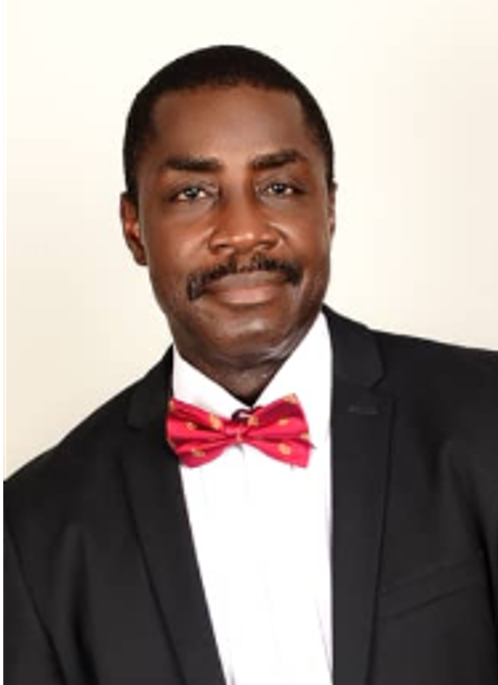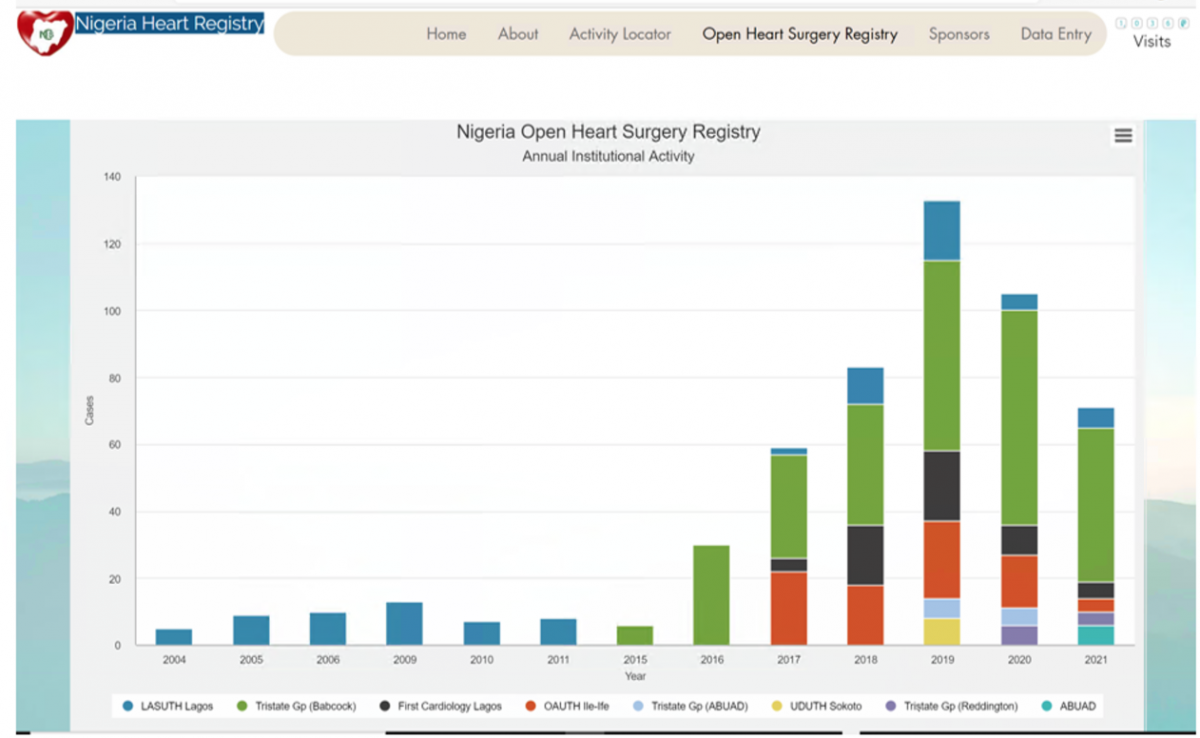ALERT!
This site is not optimized for Internet Explorer 8 (or older).
Please upgrade to a newer version of Internet Explorer or use an alternate browser such as Chrome or Firefox.
Featured Profile and Interview With Bode Falase, MD, FRCS, CTh, FWACS, PGDip Informatics

Dr Bode Falase is a consultant and an associate professor of Cardiothoracic Surgery at the Lagos State University Teaching Hospital in Lagos, Nigeria. Dr Falase earned his MB and BS, as well as conducted his surgery residency, at the University College Hospital in Ibadan, Nigeria. He completed his cardiothoracic surgery residency in Wales, United Kingdom, at Morriston Hospital Swansea and University Hospital of Wales Cardiff. After receiving the Intercollegiate Fellowship in Cardiothoracic Surgery from the Royal College of Surgeons in Edinburgh, Scotland, Dr Falase returned to Nigeria in 2006 to take up practice at the Lagos State University Teaching Hospital. He has continued to practice in Lagos, apart from a one-year return in 2015 as a specialist registrar at the Royal Victoria Hospital Belfast, Northern Ireland.
Dr Falase’s research focuses on the development of modern cardiothoracic surgery services in Nigeria, especially open heart surgery. His clinical interests include adult cardiac surgery, pacemaker implantation, VATS, and esophageal stenting. Dr. Falase is actively involved in the development of online registries of cardiothoracic surgery clinical activity in Nigeria, which are aimed at developing evidence-based practices. He has developed registries for the Cardiothoracic Division in LASUTH as well as for the Nigeria Heart Registry. Dr Falase is the past president of the Association of Cardiovascular and Thoracic Surgeons of Nigeria (ACTSON).
On a personal note, Dr Falase is a golfer with a handicap of 10, but he emphasizes that he is working on getting back to a single handicap!
Catherine Marcic Joyce for CTSNet:
CTSNet: You started your cardiothoracic surgery residency in Nigeria and then went on to complete your residency in Wales, United Kingdom. What was the most interesting or valuable aspect of pursuing training in a different country?
Bode Falase: I left to restart my cardiothoracic residency in the UK. I made an assessment considering the exposure obtainable at that time that I could not complete my residency training in Nigeria and be well versed in all aspects of cardiothoracic practice. Structured exposure to open-heart surgery was absent at the time. This was my main reason for going to the UK.
The most valuable aspect for me having trained in the UK was getting trained to a high standard, such that I could aspire to return home and help to develop a modern cardiothoracic practice in LASUTH. It has been a long journey, but I am convinced I made the right choices, both for training abroad and returning home to practice. Following my training in the UK, if I had stayed there to practice, I would be one of many surgeons practicing abroad. By returning home, I am one of a few UK-trained surgeons practicing in Nigeria. This has empowered me to drive development in my specialty.
CMJ: Not much is known about cardiac surgery in Nigeria. What is the current situation? How many active centers exist and what number of cases are being done?
BF: Open heart surgery in Nigeria has had its ups and downs, but it is now definitely growing. The history of open heart surgery started with the pioneering cases done at the University of Nigeria Teaching Hospital Enugu and the University College Hospital Ibadan in 1974 and 1978 respectively.
Surgical activity has however not been consistent, until recently.
What progress has been made? I published a paper in 2016 titled “The challenges of cardiothoracic practice in Nigeria: A 12-year institutional experience.” This included a survey of all the centers involved in open heart surgery. The results showed that during 1974-2016, 15 centers had open heart surgery activity. Ten were public institutions, and five were private institutions. They carried out 496 cases between them; however, the main driver of surgical activity was cardiac missions by various visiting teams in 10 institutions.
What is the story now? The Nigeria Heart Registry shows that we now have six institutions where regular open-heart surgery is being done by resident teams. There are two public institutions, and four private Institutions. The two public institutions are Lagos State University Teaching Hospital and Obafemi Awolowo Teaching Hospital. The four private institutions are Tristate Group-Babcock University, Tristate Group-Reddington Hospital, First Cardiology Consultants, and Afe Babalola University Teaching Hospital.
Between 2017 and 2021, these six institutions performed 402 cases. This means that in the last four years, we have averaged 100 cases a year and have done almost as many cases as in the preceding 40 years. Of particular interest is the fact that 85% of the cases have been done by the resident teams. Despite the COVID-19 pandemic, open-heart surgery activity has continued, with all the cases in 2021 being done so far by the local resident teams.
CMJ: Why do volumes remain low when the need is so great?
BF: There have been some limitations on getting our numbers up. These include having appropriate infrastructure, equipment, consumables for open heart surgery, laboratory support (including cardiac catheterization lab support), out-of-pocket payments for open heart surgery being the major funding mechanism, a dearth of trained manpower across the cardiac teams, and the penchant for Nigerians who can afford it to hop on a plane to have their surgery abroad. It is not one size fits all, and the influence of these factors has varied across institutions trying to get open heart surgery going.
We are now seeing a trend across all the active institutions of increased referrals and increasing volumes. At LASUTH, we are now able to schedule a case every two weeks. We hope that before the end of the year, we will have enough volume to take on a case each week. I must thank the management of LASUTH for creating an enabling and supportive environment. This has been the platform for the growth of the open heart surgery program.
Another important factor is building up public confidence. The public needs to know that cases are being successfully done by the resident teams with good outcomes. We are also working with various foundations to raise funds for indigent patients. This will also help to increase the numbers.
CMJ: We have heard that there is now an open heart registry in Nigeria. Can you tell us more about this?
BF: Where do I start? I could go on about this all day, so will keep this brief but highlight key areas, as well as give some background information to give appropriate context.
I have a keen interest in designing databases for collecting clinical data. I was largely self-taught during my training in the UK. I started with books from PC World. I got the For Dummies book series which covered building computers, learning Microsoft Word, Microsoft Excel, Microsoft PowerPoint, and finally, Microsoft Access, which enabled me to build simple relational databases.
I formalized my interest in the use of computers in medicine by completing a postgraduate diploma in Healthcare Informatics at the University of Bath. The highlight of my tinkering was that I was able to build a database for the Cardiac Surgical Unit at the Aberdeen Royal Infirmary, basing it upon the fields used in the UK Blue Book (the recommended minimum dataset for data collection in cardiac surgery). This database was used to collect open heart surgery data for two years before transitioning and exporting the data to a commercial system called Tomcat (used by all the cardiac units in Scotland).
Upon my return to Nigeria in 2006, I met an unfamiliar terrain. There were no electronic health records to work with, especially for my specialty. I thus set about designing Microsoft Access databases for collecting cardiothoracic clinical data. Databases I designed included a database for general cardiothoracic cases, a pacemaker database (using the European pacemaker codes), a billing manager for the cost of operations, and an open heart surgery database.
I soon realized there were some limitations to Microsoft Access databases. The main challenge was not having remote simultaneous access by different users. I therefore decided to explore the option of taking the databases online. I chose Caspio Bridge (USA) as the platform for designing the online databases as the structure was similar to Microsoft Access. I migrated all the Microsoft Access databases across to Caspio Bridge and created a LASUTH Cardiothoracic Manager which is hosted on a website (https://www.lasuthcardiothoracic.org). Features of the LASUTH Cardiothoracic Manager include summary data of all our surgical activity, automatic generation of residents’ logbooks, ability to search and retrieve data about operation categories and diagnoses, maintaining a waiting list, generating a surgery schedule calendar for planned cases, pacemaker database for implantation and pacemaker checks, and finally a billing manager to generate detailed costing for all cardiothoracic procedures in LASUTH.
As the immediate past president of the Association of Cardiovascular and Thoracic Surgeons of Nigeria and a member of the Nigerian Cardiac Society, I convinced my colleagues it was time to start collecting data on our open heart surgery practice in Nigeria. We agreed to collect a limited dataset to start with to encourage submissions. The fields collected are institution, age, gender, primary diagnosis, secondary diagnosis, Euroscore II, operation, cardiac procedure category, date of surgery, surgeon (resident surgeon or visiting surgeon), operative findings, operative description, CPB time, cross clamp time, type of valve prosthesis (where applicable), complications, and outcome.
The creation of the Nigeria Heart Registry was enabled by the work I had already put into creating the LASUTH Cardiothoracic Manager. The Nigeria Heart Registry is hosted at https://www.nigeriaheartregistry.com. With this registry, summary data of open-heart surgery practice in Nigeria, which was previously unavailable, is now available. Data entry is by secure log in, otherwise the rest of the registry is freely accessible to the public. This registry would not have been possible without a generous educational grant of $4,300 from CardioStart International and Edwards Lifesciences. This has pre-paid the Caspio Bridge subscription for one year.
We are hoping that we can get further help from educational bodies, surgical associations, charities, or industry to pay for a couple more years. This will help remove some financial pressure so that we can keep developing and populating the Nigeria Heart Registry. Below is a screenshot from the Nigeria Heart Registry showing a graph of the activity from participating institutions from 2006 – 2021.
CTSNet: Thank you, Dr Falase.






Comments